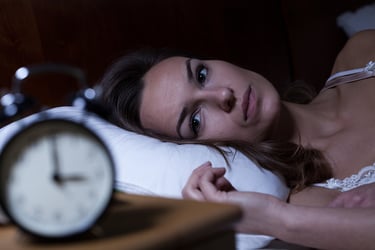
Insomnia might not be the only physical complaint if you have celiac disease or are gluten-sensitive.
You might also have unexplained migraines, joint soreness, Hashimoto's and or hypothyroidism, frequent abdominal pain, infertility and depression. Sleep disturbances are common with both conditions. If you lose sleep that loss perpetuates all of the other symptoms.
We offer comprehensive neuroendocrine tests that pinpoint amino acid levels, oxidative stress and stress hormones so that we can implement strategic treatment protocols for your sleep issues.
Yesterday, one of our ozone patients was complaining of her worsening depression and inability to get good quality sleep each night. I asked if she was eating gluten again and BINGO she was. This individual cannot ingest gluten as it hijacks her immune function and directly causes serotonin levels to drop. She is left with a racing mind, heightened anxiety, full-blown depression, body aches and difficulty with daily functioning. I reminded her that gluten for her is like "crack cocaine"; she simply cannot have it.
The experts agree because over 50 percent of newly diagnosed celiacs have sleep disturbances.They have difficulty falling asleep, staying asleep, daytime sleepiness and don't feel rested after hours of sleep. Even when some eliminate gluten sleep issues remain for a longer period of time until the brain readjusts.
Celiacs and celiac-sensitive individuals bounce between depression and anxiety in big numbers. The rates are staggering.
Gluten acts as a central nervous system stimulant causing oxidative stress and inflammatory fires in the brain.
Adolescents and Sleep News
Most of us think that "sleeping in" will make up for lost sleep. Wrong. Adolescents with sleep deprivation felt better after getting 10 hours of sleep, but psychomotor test scores revealed that their functioning did not recover. That functioning affects critical thought, driving, response times and taking tests.
A recent Australian study found that adolescents are "chronically sleep deprived" and even if adolescents slept in over the weekend this was not enough to overcome sleep deficits from the week.
Sleep-deprived students under perform academically which can lead to umemployment or lower pay employment.
Some things have to remain consistent for good health - good individualized nutrition, daily movement and adequate sleep every night.
Military PTSD and Sleep Deprivation
A Department of Defense study showed that PTSD or post-traumatic stress disorder can be helped by treating sleep problems.
We all have fear. When we are exposed to a trauma we learn to uncouple the association between the circumstances of the initial event and the trauma so when we see, hear or feel a similar circumstance later and there is no attached trauma we can learn to let it go. This is called extinction of fear.
"The extinction of fear" is impaired in sleep-deprived individuals.
Soldiers can secrete overwhelming stress hormones, be in uncomfortable environments and go without sleep for more than 24 hours. They experience life and death situations for prolonged periods of time.
Trauma can lead to sleeplessness and sleeplessness can also create biochemical trauma. Sleep deprivation can allow an individual to retain fearful memories and traumatic associations.
/blog/your-second-clock-mood-disorders-second-nature-care


